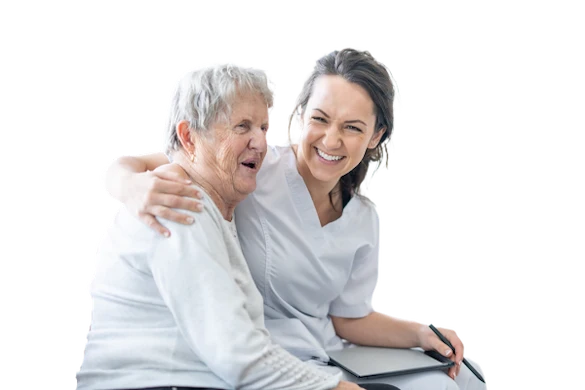A Guide for Caregiver Resources: Support, Services, and Solutions
Navigating caregiving can be overwhelming, but the right resources can make all the difference.

Caring for a senior loved one is one of the most rewarding yet challenging roles an adult child or family member can take on. With nearly 42 million adults serving as caregivers, the need for reliable resources, support, and expert guidance has never been greater. Whether you’re just beginning your caregiving journey or seeking additional support, understanding the available resources can help you provide the best care possible while maintaining your own well-being.
Key Takeaways



Preparing Yourself for Caregiving
Becoming a caregiver is a significant commitment that requires thoughtful planning, emotional readiness, and practical preparation. While providing care for a loved one can be deeply rewarding, it also comes with challenges that can impact your time, finances, and well-being. Before stepping into this role, it’s important to assess what caregiving will require and determine how best to support both your loved one and yourself.
Questions to Answer If You're Considering Becoming a Caregiver
- Personal Readiness: Do you have the time, physical ability, and emotional resilience to provide ongoing care? If not, what additional support will you need?
- Financial Planning: Does your loved one have long-term care insurance or savings for caregiving expenses? What costs might you need to cover?
- Health Needs: What are their current health conditions, mobility limitations, and medication requirements? Are you prepared to assist with daily medical or personal care tasks?
- Family Communication: Have you discussed caregiving responsibilities with other family members? Will they contribute financially or share caregiving duties?
- Legal & Medical Directives: Are powers of attorney, advance directives, and wills in place? Consulting an elder law attorney can help ensure these documents reflect your loved one’s wishes.
Getting Organized as a Caregiver
- Keep a Care Calendar: Use an online or physical calendar to track appointments, schedules, and important events.
- Create a Contact List: Maintain an easily accessible list of doctors, insurance providers, legal advisors, emergency contacts, and other essential professionals.
- Track Medications: Write down all medications, dosages, and schedules.
- List Caregiving Tasks: Document daily routines, including meal preferences, hygiene needs, and medical equipment locations so if you ever need a backup, they can easily step in.
- Identify Home Modifications: Assess whether adjustments—such as grab bars, ramps, or different bedding are needed to make the home safer and more accessible.
- Streamline Communication: Consider using a group chat, shared document, or caregiving app to update family and friends so everyone can be on the same page.
Building a Caregiver Support Network for Yourself
Balancing caregiving responsibilities with personal well-being is crucial. Caregivers are at higher risk for stress-related health issues, including heart disease, obesity, and depression. Establish a caregiver support network and seek professional help when needed.
Self-Care Tips for Caregivers:
- Set aside personal time each day, even if just for 15 minutes.
- Join a caregiver support group to connect with others facing similar challenges.
- Accept help from family and friends when offered.
- Practice mindfulness or relaxation techniques to manage stress.
- Stay active and maintain a balanced diet to support your physical health
Hiring Caregiver Support Services
Caring for a loved one is a deeply personal decision, and while some choose to become caregivers themselves, it's not the right path for everyone. The most important thing is ensuring your loved one receives the care they need. Every caregiving situation is unique, and the right support can make a big difference. Caregiving services generally fall into two categories: non-medical and Medicare-certified.
Home Care (Non-Medical)
Non-medical home care, also sometimes referred to as companion care or private duty care, provides support with daily tasks such as cooking, housekeeping, help with bathing, dressing or toileting, and companionship.
- Light housekeeping
- Grocery shopping and meal preparation
- Bathing and dressing assistance
- Companionship
- Transportation and errand services
- Therapy assistance
- Medication reminders
Home Health (Medicare-Certified)
Home Health, Medicare-certified, provides a variety of health and personal care services in the comfort of your own home. These providers are typically used after a hospital stay in lieu of moving into a skilled nursing/long-term care community. Care provided can include:
- Alzheimer’s and dementia care
- Stroke, cancer, and heart disease recovery
- Hospice and palliative care support
Selecting a Caregiver
To ensure you feel confident in your decision, it’s essential to interview potential caregiving services. Here are a few questions we recommend you ask when selecting a caregiver:
- Are they company employees or independent contractors?
- Have background and reference checks been conducted?
- Does the caregiver have liability insurance?
- How is scheduling handled, and are there backup options for no-shows?
- Are supervisory visits conducted to ensure quality care?
A Guide To: Caregiving Resources
We’ve created a free downloadable guide to support caregivers that includes essential information for getting started as a caregiver yourself, or how to select the best provider for your loved one.
No signup required. Just click, print, and start preparing.
Family Caregiver Tips: Legal Documents You Need
This podcast episode features elder law and estate planning attorney Andrea Lee, who shares essential legal and practical tips for unpaid family caregivers. Drawing from her 15 years of experience and her personal journey caring for her mother with dementia, Andrea discusses the critical legal documents caregivers need—such as financial and healthcare powers of attorney—to protect their loved ones and navigate complex family dynamics. She also offers advice on choosing the right person for decision-making roles, emphasizing the importance of strong communication and planning skills.
Top Tips for Caregivers
In this episode, Kitty Norton, director of the documentary Wine, Women, & Dementia, joins Suzanne to share her best advice for caregivers. As her film premieres on PBS, Kitty discusses the realities of caregiving, offering insights and support for those navigating dementia care. Listeners will gain valuable perspective from her experiences and learn practical tips to help caregivers on their journey.
Caregivers: You Deserve Some Self-Care
In this episode, Dr. Shawn Weiss joins Suzanne from Answers to Elders to discuss the importance of emotional wellness for caregivers and care partners. She shares insights on how burnout affects both mental and physical health and offers practical self-care strategies to prevent exhaustion. From small breaks to mindset shifts, Dr. Weiss emphasizes that taking care of yourself is essential to providing the best care for a loved one.
When Caring for a Loved One Requires Extra Support
As your loved one’s needs evolve, exploring care options like assisted living, memory care, or skilled nursing ahead of time can help you feel more prepared and confident. Planning early not only ensures they receive the right support when they need it, it also brings peace of mind and reduces stress for the whole family.
Different Types of Senior Living & Care
- 24/7 staff assistance for activities of daily living
- Social programs and recreational activities
- Private or shared living spaces with communal dining
- Specialized support for individuals with Alzheimer’s or dementia
- Secure environment to prevent wandering
- Structured daily routines to support cognitive function
Long-Term Care & Skilled Nursing (LTC/SN):
- 24/7 medical care and supervision
- Rehabilitation services for post-surgery recovery
- Assistance with all aspects of daily living
Conclusion
Caring for a loved one is a journey that comes with both challenges and deeply meaningful moments. Whether you’re just stepping into a caregiving role or looking for new ways to manage an evolving situation, having the right caregiver resources can make all the difference. From organizing care schedules and understanding legal documents to exploring in-home support or senior living options, being informed helps you make confident decisions every step of the way.
At Senior Care Finder, we partner with trusted experts like Answers for Elders to connect you with compassionate, easy-to-access guidance that supports both you and your loved one. Remember, you don’t have to do this alone—there’s help available, and it starts with knowing where to look.
Explore more caregiver tools, educational content, and senior care options on Senior Care Finder to take the next step with clarity and peace of mind.
About Senior Care Finder
Senior Care Finder helps families and individuals find the right senior living or care option with ease. Our platform is transparent, ungated, and designed to connect you directly with providers—no middlemen and no cost. Start your search today at SeniorCareFinder.com.